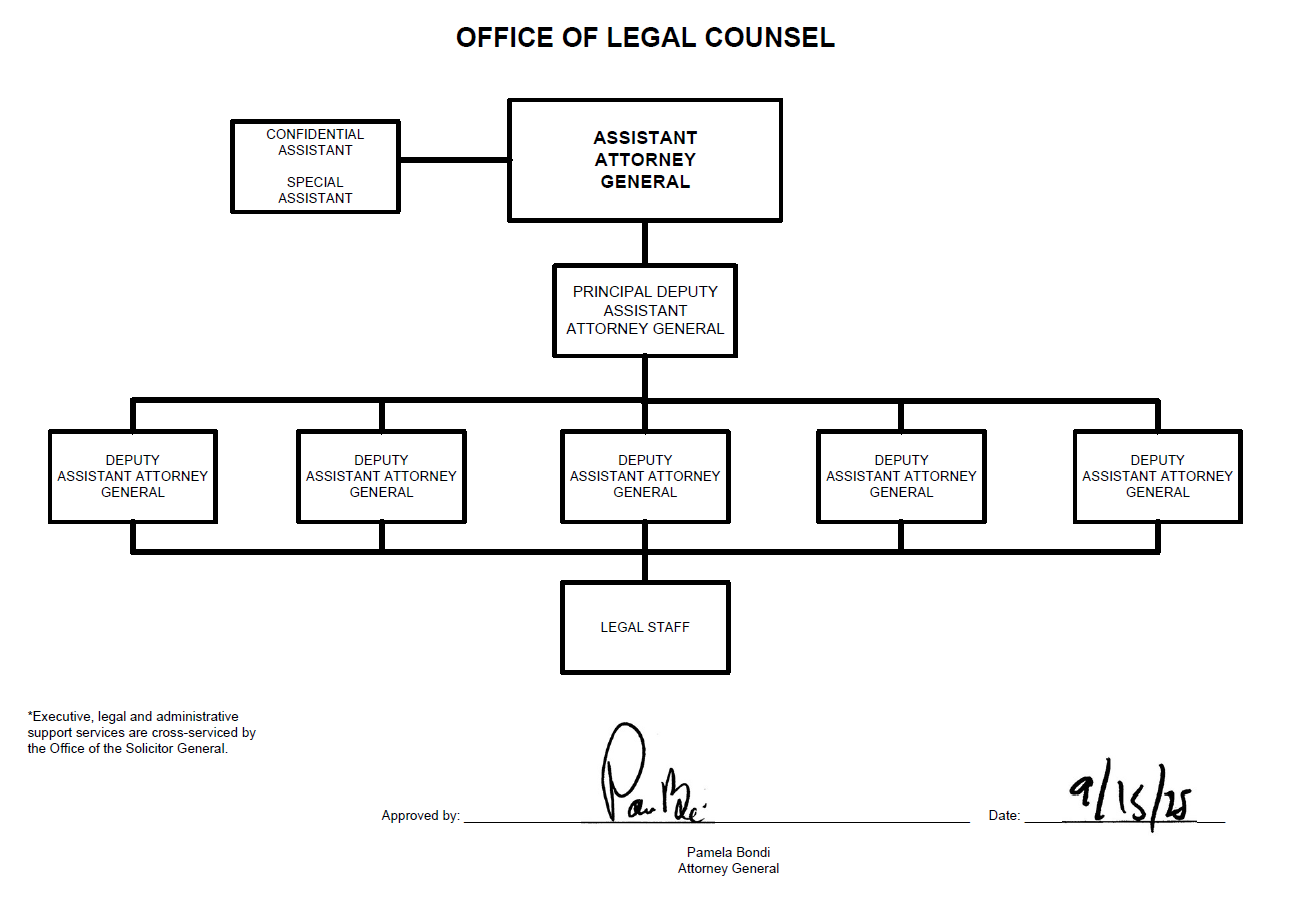Office of Legal Counsel
Office of Legal Counsel (OLC) Organizational Chart - printable PDF
- Assistant Attorney General
- Confidential Assistant
- Special Assistant
- Principal Deputy Assistant Attorney General
- Deputy Assistant Attorney General
- Legal Staff
- Deputy Assistant Attorney General
- Legal Staff
- Deputy Assistant Attorney General
- Legal Staff
- Deputy Assistant Attorney General
- Legal Staff
- Deputy Assistant Attorney General
- Legal Staff
- Deputy Assistant Attorney General
Executive, legal and administrative support services are cross-serviced by the Office of the Solicitor General
Approved by: Pamela Bondi, Attorney General
September 15, 2025
History
The Office of Legal Counsel (OLC) has often been described as “the Attorney General’s lawyer” because of its responsibility to assist the Attorney General in his or her capacity as legal adviser to the President and agencies in the Executive Branch. This function has its origins in the Judiciary Act of 1789, which required the Attorney General to “give his advice and opinion upon questions of law when required by the President of the United States, or when requested by the heads of any of the departments touching any matters that may concern any of their departments.” This function continues under current law, which requires the Attorney General to give his or her “advice and opinion on questions of law when required by the President,” 28 U.S.C. § 511, and to provide “opinion[s] . . . on questions of law” that “aris[e] in the administration of [an executive] department” when asked for such opinions by the department head, id. § 512; see also id. § 513 (similar as to requests on questions of law from military departments). In addition to this statutory authority, the Attorney General provides legal advice under Executive Order 12146, which calls for agency heads who serve at the pleasure of the President to submit interagency legal disputes to the Attorney General for resolution. The current regulations of the Department of Justice (“Department” or “DOJ”) give OLC the duty of, among other things, providing “opinions and legal advice to the various agencies of the Government” and “assisting the Attorney General in the performance of his functions as legal adviser to the President.” 28 C.F.R. § 0.25(a).
Mission
OLC’s principal duty is to assist the Attorney General in their role as legal advisor to the President and Executive Branch agencies. A substantial portion of OLC’s resources is devoted to providing legal advice to the White House, the Attorney General, and other Executive Branch agencies on legal issues related to a variety of constitutional and statutory matters of vital national concern. OLC also reviews for form and legality all Executive Orders and substantive Proclamations and Memoranda to be issued by the President, as well as all proposed Orders of the Attorney General and all regulations requiring Attorney General approval.
Major Functions
The major functions of the OLC are to:
- Provide authoritative legal advice, including via written opinions, to the President and Executive Branch agencies on a wide variety of constitutional and statutory questions involving the operations of the executive branch.
- Serve as arbiter of legal disputes within the Executive Branch.
- Provide legal assistance to other components of the Department of Justice, including matters in litigation.
- Review, as to form and legality, all proposed Executive Orders and substantive proclamations and memoranda to be issued by the President, and all proposed Orders of the Attorney General, including all regulations requiring Attorney General approval.
- Review pending legislation for constitutionality and other legal issues.
- Advise the Counsel to the President, Department of Justice officials, and Executive Branch agencies concerning their responses to congressional oversight inquiries.


